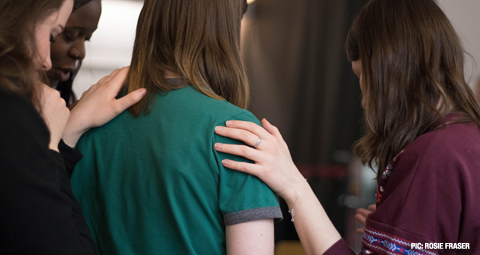BY Ryan McDougall | October 5 2018 | ![]() 0 COMMENTS
0 COMMENTS ![]() print
print

Catholic chaplaincies ‘can save lives’ of students with mental health problems
Publication Date: 2018-10-05
Ahead of World Mental Health Day, chaplains and mental health advocates have highlighted the role chaplaincies can play in combating the crisis facing young people
Catholic chaplaincies can ‘save lives’ and play an integral part in helping young people dealing with mental illnesses, according to Scottish chaplains and mental health advocates speaking ahead of World Mental Health Day on Wednesday October 10.
The comments came as statistics highlighted that one in three university first year students show signs of a mental health disorder.
The World Health Organisation survey, completed by almost 14,000 students, suggests major depression and anxiety are the most prevalent mental illnesses in young people, while a YouGov poll on psychosis indicated that only a third of young people would know where to seek help if they or someone they know was suffering from the condition.
As students begin their first full month of university, chaplains have highlighted the benefits of joining a chaplaincy, while a Catholic mental health project has said the communities can ‘save lives.’
St Albert’s Chaplaincy in Edinburgh serves the University of Edinburgh, Edinburgh Napier University and Queen Margaret University. It is one of many chaplaincies in Scotland that offers support to young people in times of crisis.
Fr Dermot Morrin, one of three chaplains at St Albert’s, said he believes students are often the most at risk in society in terms of mental illness.
“There are far more financial pressures on students today, such as their loan debts, and the institutions they study at often put huge pressure on them to achieve,” he said.
He added that often students’ time is stretched thin, with part-time jobs that may require them to work long, late hours, while trying to find time for lectures, assessments and social time in between.
Loneliness
Fr Morrin explained that a big part of the problem is often loneliness, particularly for international students.
“Students often travel far from home, or maybe they even have issues at home, and they’re entering a big institution where they may not know anyone,” he said.
“Very often they could be from a foreign country too, such as Sweden, Rwanda, or anywhere else, which means that often they will be faced with a completely new culture and language.”
St Albert’s however, offers a community and a ‘safe haven’ for those at risk of facing mental illnesses.
Fr Morrin said that each year, when new and returning students begin their studies, he encourages them to get along to the chaplaincy to make friends, and to know that there is a safe haven for them in times of grief, bereavement, and other issues that can test a person’s mind.
“Chaplaincies provide a safe person to speak to, someone to refer to in that sense or just someone who they can trust in confidence who’s not necessarily part of the academic or financial world,” he explained.
“Sometimes even just a conversation at a particular moment can be very important to people at an age where many things become huge for them. What we offer them is the chance to build a community between themselves, which is a lovely thing to see.
“For us, it’s a lovely job to have as there are individuals who unfortunately have a lot more to carry than others, and if they’re not well or distressed the chaplaincy can provide a cushion or extra layer of support for the individual.”
Fr Stephen Latham, a new chaplain for University of the West of Scotland Ayr campus and a long-term chaplain for Queen Margaret Academy, also in Ayr, agreed with Fr Morrin, stating chaplaincies provide ‘a safe place and a safe face for people to talk to.’
He said that often, while providing spiritual support, he would also ensure that the institution is able to help the individual access professional medical help.
“For me, it’s about ‘wasting time’ with the pupils or students—getting to know them, especially in the dining hall at lunchtime etc. If the moment’s right, it gives them the chance to open up about the things that are troubling them.
“Older people might be inclined to go directly to their church for support, but for younger people it might seem alien—a chaplaincy is important in breaking down those barriers—it gives people the chance to see the good things in life and to open up about the issues that are concerning them.”
Fr Michael John Galbraith, the Catholic chaplain for the University of St Andrews, added that the university staff are also skilled at helping students, ‘making available in-service days for issues such as mental health,’ which they are encouraged to attend to increase awareness of the problem.
Stephanie MacGillivray co-runs The Catholic Mental Health Project, an initiative of the Bishops’ Conference of England and Wales. Having been a student herself just four years ago, Ms MacGillivray said she speaks from personal experience when she says a well-run chaplaincy ‘can be life-saving.’
She added: “Having a community of people to talk to, pray with, eat with, and share an understanding and perspective on life with is an underrated part of being not just a Catholic, but more widely just a human being.
“When you know that you have a non-judgmental space to go to where people want to support each other and help each other to grow, large problems can seem immediately smaller.
Fr Stephen Latham, a new chaplain for University of the West of Scotland Ayr campus and a long-term chaplain for Queen Margaret Academy, also in Ayr, agreed with Fr Morrin, stating that chaplaincies provide ‘a safe place and a safe face for people to talk to.’
He said that often, while providing spiritual support, he would ensure that the institution is able to help the individual to access professional medical help.
“For me, it’s about ‘wasting time’ with the pupils or students—getting to know them, especially in the dining hall at lunchtime etc.
“If the moment’s right, it gives them the chance to open up about the things that are troubling them.
“Older people might be inclined to go directly to their church for support, but for younger people it might seem alien—a chaplaincy is important in breaking down those barriers.
“It gives people the chance to see the good things in life and to open up about the issues that are concerning them.”
Fr Michael John Galbraith, the Catholic chaplain for the University of St Andrews, added that the university staff are also skilled at helping students, ‘making available in-service days for issues such as mental health,’ which they are encouraged to attend to increase awareness of the problem.
Stephanie MacGillivray co-runs The Catholic Mental Health Project, an initiative of the Bishops’ Conference of England and Wales. Having been a student herself just four years ago, Ms MacGillivray said she speaks from personal experience when she says a well-run chaplaincy ‘can be life-saving.’
She added: “Having a community of people to talk to, pray with, eat with, and share an understanding and perspective on life with is an underrated part of being not just a Catholic, but more widely just a human being.
“When you know that you have a non-judgemental space to go to where people want to support each other and help each other to grow, large problems can seem immediately smaller.”
A spokesperson for the Church in Scotland said: “University and school chaplaincy services offer vital support networks for those experiencing mental health issues by nurturing environments where young people feel that they belong, are valued and trusted.
“This reflects recent studies that show good spiritual health can have a positive impact on mental and physical well-being, by helping people find connectedness, meaning and purpose in our increasingly individualistic and secular society.
“We know that each person is endowed with inherent dignity, created in the image and likeness of God and as a Church we must continue to reach out to the one in four people who experience a mental health issue every year.”










